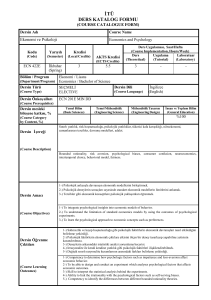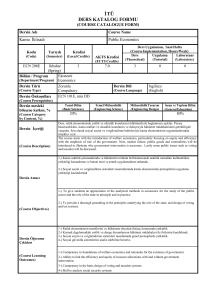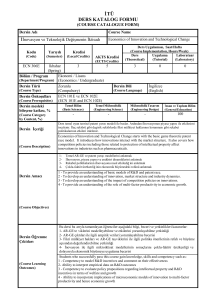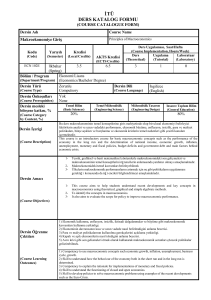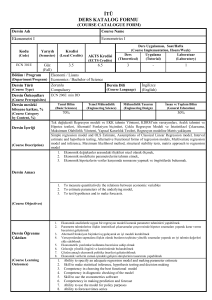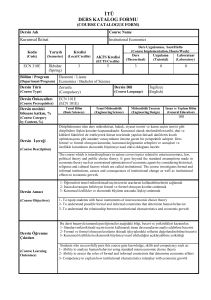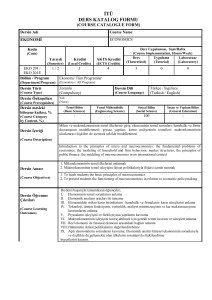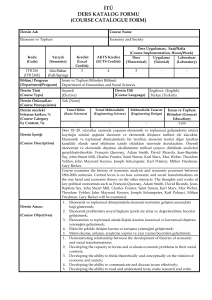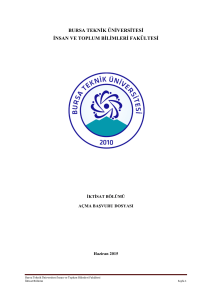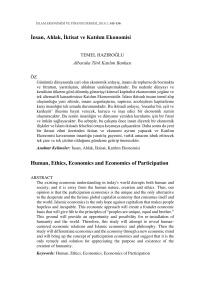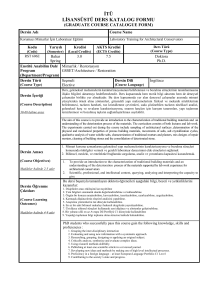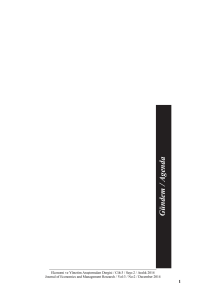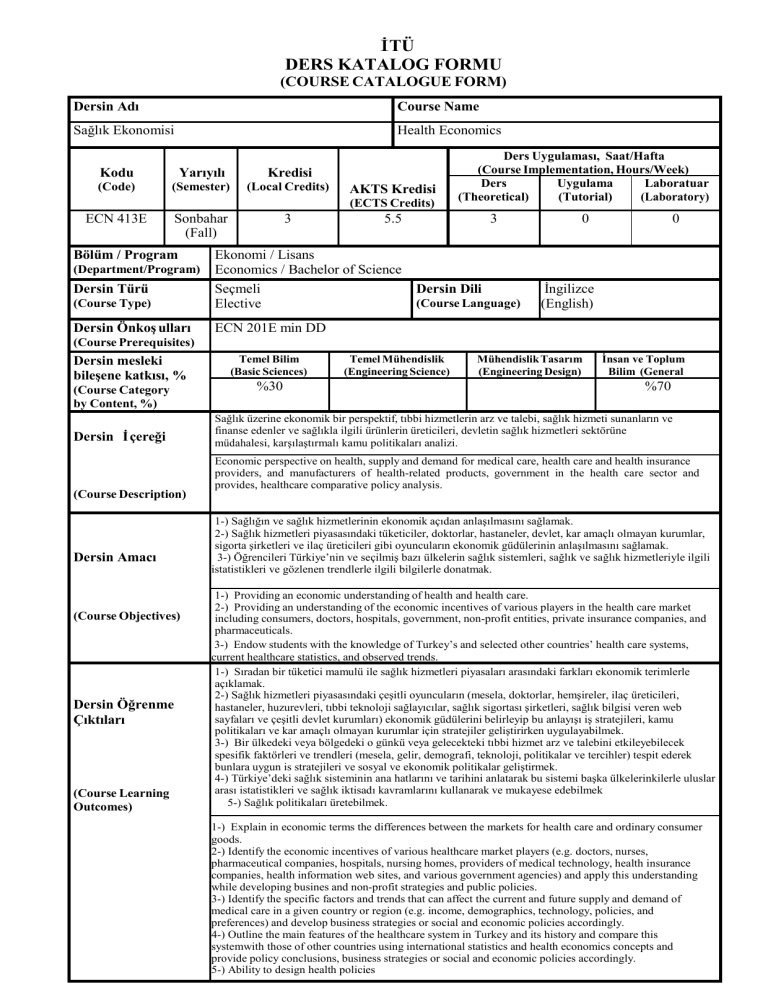
İTÜ
DERS KATALOG FORMU
(COURSE CATALOGUE FORM)
Dersin Adı
Course Name
Sağlık Ekonomisi
Health Economics
Kodu
Yarıyılı
Kredisi
(Code)
(Semester)
(Local Credits)
AKTS Kredisi
(ECTS Credits)
ECN 413E
Sonbahar
(Fall)
Bölüm / Program
3
5.5
(Course Type)
Ekonomi / Lisans
Economics / Bachelor of Science
Seçmeli
Elective
Dersin Önkoş ulları
ECN 201E min DD
(Department/Program)
Dersin Türü
Ders Uygulaması, Saat/Hafta
(Course Implementation, Hours/Week)
Ders
Uygulama
Laboratuar
(Theoretical)
(Tutorial)
(Laboratory)
3
Dersin Dili
(Course Language)
0
0
İngilizce
(English)
(Course Prerequisites)
Dersin mesleki
bileşene katkısı, %
(Course Category
by Content, %)
Dersin İ çereği
(Course Description)
Dersin Amacı
(Course Objectives)
Dersin Öğrenme
Çıktıları
(Course Learning
Outcomes)
Temel Bilim
(Basic Sciences)
%30
Temel Mühendislik
(Engineering Science)
Mühendislik Tasarım
(Engineering Design)
İnsan ve Toplum
Bilim (General
Education)
%70
Sağlık üzerine ekonomik bir perspektif, tıbbi hizmetlerin arz ve talebi, sağlık hizmeti sunanların ve
finanse edenler ve sağlıkla ilgili ürünlerin üreticileri, devletin sağlık hizmetleri sektörüne
müdahalesi, karşılaştırmalı kamu politikaları analizi.
Economic perspective on health, supply and demand for medical care, health care and health insurance
providers, and manufacturers of health-related products, government in the health care sector and
provides, healthcare comparative policy analysis.
1-) Sağlığın ve sağlık hizmetlerinin ekonomik açıdan anlaşılmasını sağlamak.
2-) Sağlık hizmetleri piyasasındaki tüketiciler, doktorlar, hastaneler, devlet, kar amaçlı olmayan kurumlar,
sigorta şirketleri ve ilaç üreticileri gibi oyuncuların ekonomik güdülerinin anlaşılmasını sağlamak.
3-) Öğrencileri Türkiye’nin ve seçilmiş bazı ülkelerin sağlık sistemleri, sağlık ve sağlık hizmetleriyle ilgili
istatistikleri ve gözlenen trendlerle ilgili bilgilerle donatmak.
1-) Providing an economic understanding of health and health care.
2-) Providing an understanding of the economic incentives of various players in the health care market
including consumers, doctors, hospitals, government, non-profit entities, private insurance companies, and
pharmaceuticals.
3-) Endow students with the knowledge of Turkey’s and selected other countries’ health care systems,
current healthcare statistics, and observed trends.
1-) Sıradan bir tüketici mamulü ile sağlık hizmetleri piyasaları arasındaki farkları ekonomik terimlerle
açıklamak.
2-) Sağlık hizmetleri piyasasındaki çeşitli oyuncuların (mesela, doktorlar, hemşireler, ilaç üreticileri,
hastaneler, huzurevleri, tıbbi teknoloji sağlayıcılar, sağlık sigortası şirketleri, sağlık bilgisi veren web
sayfaları ve çeşitli devlet kurumları) ekonomik güdülerini belirleyip bu anlayışı iş stratejileri, kamu
politikaları ve kar amaçlı olmayan kurumlar için stratejiler geliştirirken uygulayabilmek.
3-) Bir ülkedeki veya bölgedeki o günkü veya gelecekteki tıbbi hizmet arz ve talebini etkileyebilecek
spesifik faktörleri ve trendleri (mesela, gelir, demografi, teknoloji, politikalar ve tercihler) tespit ederek
bunlara uygun is stratejileri ve sosyal ve ekonomik politikalar geliştirmek.
4-) Türkiye’deki sağlık sisteminin ana hatlarını ve tarihini anlatarak bu sistemi başka ülkelerinkilerle uluslar
arası istatistikleri ve sağlık iktisadı kavramlarını kullanarak ve mukayese edebilmek
5-) Sağlık politikaları üretebilmek.
1-) Explain in economic terms the differences between the markets for health care and ordinary consumer
goods.
2-) Identify the economic incentives of various healthcare market players (e.g. doctors, nurses,
pharmaceutical companies, hospitals, nursing homes, providers of medical technology, health insurance
companies, health information web sites, and various government agencies) and apply this understanding
while developing busines and non-profit strategies and public policies.
3-) Identify the specific factors and trends that can affect the current and future supply and demand of
medical care in a given country or region (e.g. income, demographics, technology, policies, and
preferences) and develop business strategies or social and economic policies accordingly.
4-) Outline the main features of the healthcare system in Turkey and its history and compare this
systemwith those of other countries using international statistics and health economics concepts and
provide policy conclusions, business strategies or social and economic policies accordingly.
5-) Ability to design health policies
Ders Kitabı
Health Economics, Charles E. Phelps, Addison Wesley; 5th edition.
(Textbook)
Diğer Kaynaklar
(Other References)
The Economics of Health and Health Care, Sherman Folland, Allen Goodman, Miron
Stano, Prentice Hall; 6th edition
The Handbook of Health Economics, Anthony J. Culyer and Joseph P. Newhouse, eds., Elsevier
Science, 2000.
Ödevler ve Projeler
4 problem sets and 2 quizzes
(Homework & Projects)
4 problem sets and 2 quizzes
Laboratuar Uygulamaları
(Laboratory Work)
Bilgisayar Kullanımı
(Computer Use)
Diğer Uygulamalar
(Other Activities)
Baş arı
Değerlendirme
Sistemi
(Assessment Criteria)
Faaliyetler
(Activities)
Yıl içi Sınavları
(Midterm Exams)
Kısa Sınavlar
(Quizzes)
Ödevler
(Homework)
Projeler
(Projects)
Dönem Ödevi/Projesi
(Term Paper/Project)
Laboratuar Uygulaması
(Laboratory Work)
Diğer Uygulamalar
(Other Activities)
Final Sınavı
(Final Exam)
Adedi
(Quantity)
1
Değerlendirmedeki Katkısı, %
(Effects on Grading, %)
25
2
10
4
20
1
45
DERS PLANI
Hafta
1
2
3
4
5
6
7
8
9
10
11
12
13
14
Konular
Sağlık ekonomisi ve miroekonomik araçlar hakkında temel kavramlar
Tıbbi bakım talebi
Sağlık üretim fonksiyonu ve tıbbi bakım
Tıbbi bakım talebi hakkında ampirik çalışmalar: RAND çalışması
Tıbbi bakım talebi hakkında ampirik çalışmalar: diğer çalışmalar
Tıbbi bakım arzı: doktorların sağlık üretiminde girdi alınması
Tıbbi bakım arzı: doktor piyasasında endüstriyel organizasyon
Tıbbi bakım arzı: hastanelerin sağlık üretiminde girdi alınması
Tıbbi bakım arzı: hastane piyasasında endüstriyel organizasyon
Sağlık sigortası talebi: olumsuz seçim ve ahlaki tehlike
Sağlık sigortası arzı ve organize bakım
Farmasötik endüstri ekonomisi ve farmasötik analize giriş
Tıbbi bakım sistemlerinin karşılaştırmalı analizi
Sağlık ve ekonomik gelişmede küresel yönetişim sorunları
Dersin
Çıktıları
1
3
3
2,3
2,3
2,3
2,3
2,3
2,3
3,4
3,4
3,4
3,4,5
3,4,5
COURSE PLAN
Weeks
1
2
3
4
5
6
7
8
9
10
11
12
13
14
Topics
Basic Concepts of Health Economics and Microeconomic Tools
Demand for Medical Care
Health Production Functions and Medical Care
Empirical Studies of Demand for Medical Care – RAND Study
Empirical Studies of Demand for Medical Care – Other Studies
Supply of Medical Care – Physicians as Inputs in Health Production
Supply of Medical Care – Industrial Organization of Physician Markets
Supply of Medical Care – Hospitals as Inputs in Health Production
Supply of Medical Care – Industrial Organization of Hospital Markets
Demand for Health Insurance – Adverse Selection and Moral Hazard
Supply of Health Insurance and Managed Care
Economics of the Pharmaceutical Industry and Introduction to Pharmacoeconomic Analysis
Comparative Analysis of Health Care Systems
Global Governance Challenges in Health and Economic Development
Course
Outcomes
1
3
3
2,3
2,3
2,3
2,3
2,3
2,3
3,4
3,4
3,4
3,4,5
3,4,5
Dersin Ekonomi Lisans Programıyla İlişkisi
Katkı
Seviyesi
1 2 3
x
Programın mezuna kazandıracağı bilgi ve beceriler (programa ait çıktılar)
a
b
c
d
e
f
g
h
Ekonomik ve sosyal problemleri, temsili aktörlerin amaç fonksiyonlarını bir takım kısıtlara tabi
olarak maksimize ettikleri ve buna bağ lı olarak çeşitli tarz dengelerin oluşturduğu ortamlar
şeklinde matematiksel olarak modelleyen iktisadi yaklaşımda yetkinlik.
Mikroiktisadi fiyat sistemini özel ve kamu malları ve uluslar arası ticaret bağ lamında öğrenip iş
stratejileri ve kamu politikaları tasarımında etkinlik ve eşitlik dengesini gözeterek hukuk
çerçevesinde kullanabilme yetkinliği. Bulguları Türkçe veya İngilizce olarak ifade edebilmek.
Fiyatların genel düzeyi, işsizlik ve çıktı düzeyine iliş kin temel makroekonomik modelleri inşa
edebilme kabiliyeti. Bulguları Türkçe veya İngilizce olarak ifade edebilme becerisi.
Ekonomik büyüme ve teknolojik geliş menin belirleyenlerini, sosyal fayda ve sosyal maliyetlerini
değ erlendirebilme kabiliyeti.
statistiki ve ekonometrik modelleme ve yöntemleri iktisadi ve sosyal verilerin bilgisayar
ortamında analiz edilmesinde ve yorumlanmasında temel düzeyde kullanabilme yetkinliğ i.
Bulguları Türkçe veya İngilizce olarak ifade edebilme becerisi.
Bir sektörün ekonomisinde uzmanlık geliştirme kabiliyeti. Yerli veya yabancı bir ülkedeki bir
sektörde uzmanlık.
Karar verme alanındaki standart iktisadi modellerde ve karar vermeye iliskin alternatif
varsayımlarda yetkinlik.
Yurt içinde veya dısındaki ekonomik kurumlar ve düzenlemeleri, tarihi, hukuki ve sosyal altyapıyı
dikkate alarak analiz etme yetkinligi. Bu tür bir analizi sektörel uzmanlıkla birlestirme becerisi
x
x
x
x
x
x
x
1: Az, 2. Kısmi, 3. Tam
Relationship of the course with the Bachelor of Science Program in Economics
The Knowledge, Skills and Competencies that Students will Gain from the Program
(Program Outputs)
a
b
c
d
e
f
g
h
Competency in the fundamental economic approach that models economic and social problems
mathematically as environments with various types of equilibria where representative agents
maximize their objective functions subject to a set of constraints.
Competency in the microeconomic price system in the context of private and public goods and
international trade, and the ability to design business strategies and public policies considering
efficiency-equity balance and the legal framework. Skill to express findings in Turkish or
English.
Ability to construct basic macroeconomic models regarding the general price level,
unemployment, and output. Skill to express findings in Turkish or English.
Ability to assess the social benefits, costs, and determinants of economic growth and
technological advancement.
Competency in statistical and econometric modeling and methods to analyze and interpret at a
basic level economic and social data in a computerized environment. Skill to express findings
in Turkish or English.
Ability to develop expertise in the economics of a sector. Specialty in a domestic or foreign
sector.
Competency in economic models of decision making and in alternative assumptions related to
decision-making.
Competency to analyze domestic or foreign economic institutions and regulations considering
the historical, legal, and social infrastructure. The skill to combine such an analysis with
sectoral expertise.
Level of
Contribution
1
2
3
x
x
x
x
x
x
x
1: Little, 2. Partial, 3. Full
Düzenleyen (Prepared by)
Tarih (Date)
13/06/2014
İmza (Signature)
x

